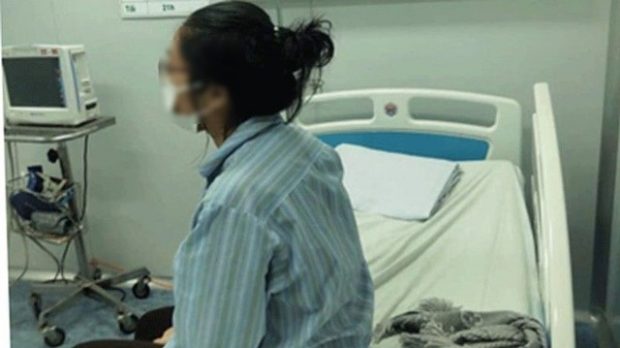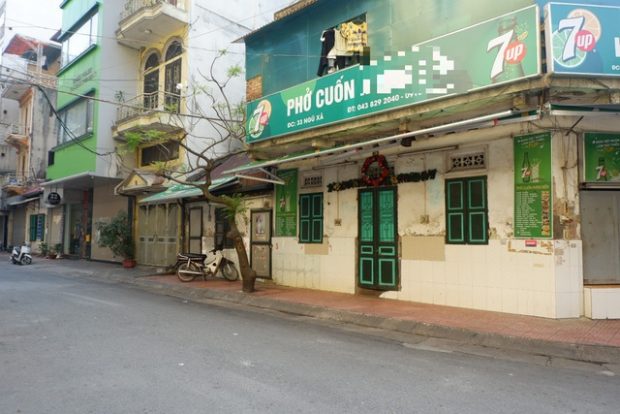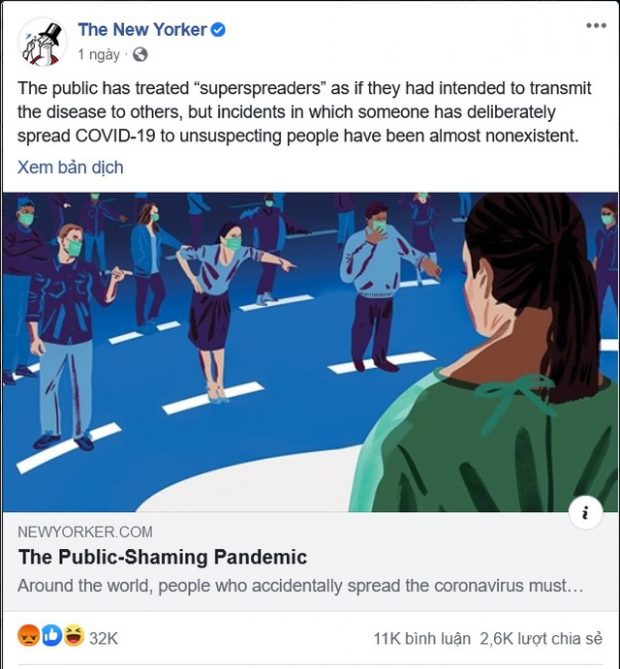
New Yorker magazine fuels Vietnamese Covid 19 super spreader debate

By Lan Phong
Head of World News,
Dantri Online Newspaper, Vietnam
HANOI: The Vietnamese rich Covid 19 infected socialite who lied about her travel history to avoid quarantine which caused a large outbreak in Hanoi in March recently again aroused public outrage after her sister told the US New Yorker magazine about how her family had been unfairly shamed online in Vietnam.
In an article entitled “The Public Shaming Pandemic” published on September 21, the New Yorker told two different stories about what Nga Nguyen, 28, and her younger sister, Nhung Nguyen, experienced when being treated as Covid 19 patients in a European country and Vietnam.
According to the newspaper, the two sisters, who were both famous on social networks for their upper class lifestyle, got the virus at two fashion shows in Italy and France in February. Nga, who lives in the UK, developed symptoms on March 1 while visiting a relative in Germany where she stayed for the treatment. Nhung was found carrying the virus after returning to her home in Hanoi some days later.
They both soon recovered after receiving treatment at local hospitals.
However, without any explanations about the tight quarantine and contact tracing regulations applied by the Vietnamese government for virus prevention, the magazine noted that “the sisters’ experience differed in one crucial way. European Union nations have strong privacy protections, and no one besides Nga’s family and a few friends knew that she had Covid 19. Nhung’s case became public knowledge.”
The author D.T. Max criticised the government and people of Vietnam for shaming the young woman.
“The Vietnamese government, which regularly uses newspaper leaks to persuade or frighten its citizens, invited the press to watch a live stream of a meeting about the young woman’s medical condition,” they wrote. “Within an hour of articles about the meeting being published, people on the internet had figured out who Nhung was and found her social media accounts.”

There were truly lots of fake news spread online around this Covid 19 case at that time as she and her sister were famous on social networks, but authorities in Hanoi had tried to correct them. Secretary of the municipal Party Committee Vuong Dinh Hue even requested the police force to strictly punish those spreading the fake news.
Meanwhile, the New Yorker’s article also contained some incorrect details when saying that “The Vietnamese government, clearly committed to making an example of Nhung, let it be known that when she flew home from London she did not mention her visit to Italy”.
According to the Noi Bai Airport border gate police, Nhung had used a British passport to travel to European countries, but she used a Vietnamese passport to enter Vietnam on March 2.
“There were no Italian entry exit stamps on her passport,” the police said. “And we allowed her to enter Vietnam without quarantine without knowing that she had made a false medical declaration.”
In their Facebook status to share the article, the New Yoker wrote: “The public has treated “superspreaders” as if they had intended to transmit the disease to others, but incidents in which someone has deliberately spread COVID 19 to unsuspecting people have been almost nonexistent.”
The post has received thousands of comments and shares but many of them expressed support for the Vietnamese government’s regulations and said the woman deserved to be publicly shamed for what she did.
“Let me tell you guys here about the facts. The girl in this story, actually faked her route when she came back from a pandemic zone. She even lied about her health condition. She brought the pandemic back to Vietnam. When, you know, we were about to remove the social distancing order. She deserves what she had. No excuses,” Ta Hien, a Facebook user, commented.
Another account by Alan Middleton said: “In law, the ‘intent’ necessary to make someone liable for causing injury is the intent to do the act that leads foreseeably to the injury. In other words, all that’s necessary is that someone with Covid intend to go to church, a rally, etc. without a mask and without social distancing. Whether or not they ‘intended’ to make someone else sick is irrelevant because making someone sick was a foreseeable result of their behaviour.”

Meanwhile, some other followers said that many of the public just criticised Nhung without much thinking.
“I do not believe most people do it on purpose; however, I do believe that many do it without thinking. You cannot control everything, but you can do what you can do. Wear a mask, keep your distance, wash your hands, don’t go into crowds if you do not have to. Use common sense,” Lee Neil wrote in a comment.
Many people from Vietnam have also left their comments on the article, expressing their disappointment at the women’s behaviour and the writer’s view on the issue.
“Perhaps she didn’t intentionally spread the virus since she had no idea she had been the Covid 19 carrier,” an account, Ba Minh Tu, said. “However, the sin must be pointed here is that she did deliberately cheat the authorities by her false submission of travel history. Treating her meticulously until the third negative test is such a privilege offered to her felonious act to her country. Her claim of being victimised must be reconsidered.
Please check the ground before releasing any articles like this to the public. Please keep your view objective and multi dimensional, don’t ruin your credibility in such an easy manner.”


